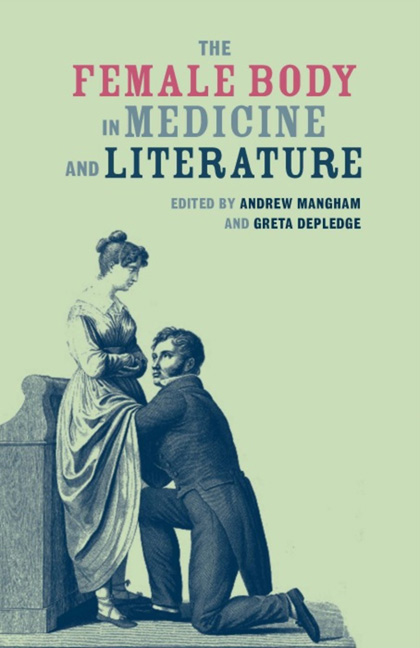Book contents
- Frontmatter
- Contents
- Acknowledgements
- Notes on Contributors
- 1 Introduction
- 2 ‘Difficulties, at present in no Degree clear'd up’: The Controversial Mother, 1600–1800
- 3 Monstrous Issues: The Uterus as Riddle in Early Modern Medical Texts
- 4 Surveilling the Secrets of the Female Body: The Contest for Reproductive Authority in the Popular Press of the Seventeenth Century
- 5 ‘Made in Imitation of Real Women and Children’: Obstetrical Machines in Eighteenth-Century Britain
- 6 Transcending the Sexed Body: Reason, Sympathy, and ‘Thinking Machines’ in the Debates over Male Midwifery
- 7 Emma Martin and the Manhandled Womb in Early Victorian England
- 8 Narrating the Victorian Vagina: Charlotte Brontë and the Masturbating Woman
- 9 ‘Those Parts Peculiar to Her Organization’: Some Observations on the History of Pelvimetry, a Nearly Forgotten Obstetric Sub-speciality
- 10 ‘She read on more eagerly, almost breathlessly’: Mary Elizabeth Braddon's Challenge to Medical Depictions of Female Masturbation in The Doctor's Wife
- 11 Mrs Robinson's ‘Day-book of Iniquity’: Reading Bodies of/and Evidence in the Context of the 1858 Medical Reform Act
- 12 Rebecca's Womb: Irony and Gynaecology in Rebecca
- 13 Representations of Illegal Abortionists in England, 1900–1967
- 14 Afterword: Reading History and/as Vision
- Index
4 - Surveilling the Secrets of the Female Body: The Contest for Reproductive Authority in the Popular Press of the Seventeenth Century
- Frontmatter
- Contents
- Acknowledgements
- Notes on Contributors
- 1 Introduction
- 2 ‘Difficulties, at present in no Degree clear'd up’: The Controversial Mother, 1600–1800
- 3 Monstrous Issues: The Uterus as Riddle in Early Modern Medical Texts
- 4 Surveilling the Secrets of the Female Body: The Contest for Reproductive Authority in the Popular Press of the Seventeenth Century
- 5 ‘Made in Imitation of Real Women and Children’: Obstetrical Machines in Eighteenth-Century Britain
- 6 Transcending the Sexed Body: Reason, Sympathy, and ‘Thinking Machines’ in the Debates over Male Midwifery
- 7 Emma Martin and the Manhandled Womb in Early Victorian England
- 8 Narrating the Victorian Vagina: Charlotte Brontë and the Masturbating Woman
- 9 ‘Those Parts Peculiar to Her Organization’: Some Observations on the History of Pelvimetry, a Nearly Forgotten Obstetric Sub-speciality
- 10 ‘She read on more eagerly, almost breathlessly’: Mary Elizabeth Braddon's Challenge to Medical Depictions of Female Masturbation in The Doctor's Wife
- 11 Mrs Robinson's ‘Day-book of Iniquity’: Reading Bodies of/and Evidence in the Context of the 1858 Medical Reform Act
- 12 Rebecca's Womb: Irony and Gynaecology in Rebecca
- 13 Representations of Illegal Abortionists in England, 1900–1967
- 14 Afterword: Reading History and/as Vision
- Index
Summary
In its 12–19 December issue of 1650, Marchamont Nedham's parliamentarian newsbook, Mercurius Politicus, recounted the startling story of Anne Greene, a 22-year old Oxford woman convicted and hanged for the murder of her newborn son, but discovered still to be alive as she was prepared for a public anatomy lecture:
Being cut down, she was put into a Coffin, and brought to the house where the body was appointed to be dissected before the company of Physicians, and other ingenuous Gentleman, who have a weekly meeting at Mr. Clarks the Apothecary, about naturall enquiries and experiments […]. When they opened the Coffin to prepare the body for dissection, they perceived some small ratling in her throat […] Dr. Petty, with Mr. Clerk of Magdalen Colledg, and Mr. Willis of Christ Church, fell speedily to use means to bring her to life. They opened a vein, layed her in a warm bed, procured a woman to goe into bed with her, and continued the use of divers other remedies respecting her senslesnesse, head, throat, and breast, so that it pleased God within 14 hours she spake, and the next day talk'd and coughed very heartily, and is now in great hope of recovery.
Characterizing the event as ‘a remarkable act of providence’, insisting on Greene's innocence of the crime for which she was executed, and warning that ‘such a contrary verdict from heaven’ should ‘strike terror to the consciences of those who have been any way faulty in this businesse’, the account also offered forensic evidence that should have resulted in Greene's acquittal – the estimated gestation period (‘near the fourth moneth of her time’), Greene's lack of awareness that she was pregnant, and the unformed state of the foetus (‘not above a span long, and of whether sexe scarce distinguished’). Three weeks later, the newsbook took up the story again by investigating Greene's memories of the ordeal she suffered from her time on the gallows through to her recovery. Around the same time, another account of this event appeared, in ‘A Wonder of Wonders, Being a faithful Narrative and true Relation, of one Anne Green’ (1651), followed later in the year by ‘A Declaration from Oxford, of Anne Greene’ (1651), and two separate editions of ‘Newes from the Dead or a True and Exact Narration of the miraculous deliverance of Anne Greene’ (1651).
- Type
- Chapter
- Information
- The Female Body in Medicine and Literature , pp. 51 - 68Publisher: Liverpool University PressPrint publication year: 2012



